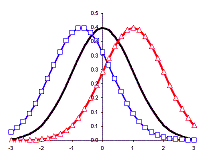| Vitae | Goal Statement | Coursework | Analytical & Integrated Thinking | Research | Professional Experiences | Dissertation Planning |
Dissertation Ideas: Portfolio III
Please download the document below to review my pre-proposal idea paper.
Pre-Proposal Idea Paper
Initial Dissertation Ideas: Portfolio II
My ideas from my initial dissertation planning section below have stayed relatively the same. However, my ideas are now more refined in terms of having specific research questions and an overall methodological design in mind.
Theoretical framework:
Stereotype threat & Self-Regulated Learning:
Stereotype threat is defined as the anxiety that an individual feels about confirming a certain stereotype about his/her social group (Aronson, 2002). Prior research shows that stereotype threat causes a decrease in academic achievement among historically stigmatized groups such as African Americans and Hispanics (Aronson & Steele, 2005). Researchers suggest that the mediators of this relationship has yet to be fully understood and are beginning to introduce social-cognitive variables such goal orientation (Ryan & Ryan, 2005) to understand this causal relationship. However, research has yet to examine stereotype threat holistically within the framework of social-cognitive theory. Social-cognitive theory asserts that individuals learn through interactions between their social environment, personal cognitive variables, and behavioral outcomes (Bandura, 1989). Therefore, I hypothesize that since stereotypes are a result of society, and if effective learning comes from information derived from one's environmental context, then the ability to effectively regulate cognitive and behavioral learning within an environmental/societal context can, indeed, lessen the impact of stereotypes on student academic performance.
The main research question of my
dissertation will be: Can self-regulation and motivation
mitigate
stereotype threat effects on achievement?
In order to answer this question, I plan on using a quasi-experimental method.
Experiment: Establishing the causal role of self-regulation in eliminating stereotype threat effects on achievement.
Sample population: Undergraduate students or graduate students
Task: TBD (Math task)
Outcome measure: Performance on the math task
(2x2 experimental design)
|
|
High Stereotype Threat |
Low Stereotype Threat |
|
No Self-Regulation Training |
I |
II |
|
Self-Regulation Training |
III |
IV |
Group I: no self-regulated training and activation of stereotype threat
Group II: no self-regulated training and no activation of stereotype threat
Group III: self-regulated training and activation of stereotype threat
Group IV: self-regulated training and no activation of stereotype threat
Intial Hypotheses:H1: Group I will perform the lowest compared to Group II, III, and IV
H2: Group II will perform higher than Group I, but lower than Group III and Group IV
H3: Group III will perform higher than Group I and Group II, but lower than Group IV
H4: Group IV will perform the highest as compared to Group I, II, and III
Initial Dissertation Ideas: Portfolio I
I have always been instructed that my dissertation topic will be strongly influenced by one research article. I am very lucky to have found that one article that has instilled interest, passion, and excitement in me at this point of my studies. That one article that I will use to guide my dissertation is a piece by Aronson and his colleagues:
Aronson, J., Lustina, M. J., Good, C., Keough, K., Steele, C. M., & Brown, J. (1999). When White men can't do math: Necessary and sufficient factors in stereotype threat. Journal of Experimental Social Psychology, 35(1), 29-46.
Specifically, Aronson et al. attempted to test the hypothesis that not only stigmatized individuals would experience the negative effects of stereotype threat and that the level of identification with the mathematics domain (e.g., math self-concept) would mediate the relationship between stereotype threat and performance. Stereotype threat was induced by telling one group of students that Asians are much better at math than Whites. The results of the experiment confirmed both hypotheses. That is, under sufficient conditions, traditionally unstigmatized individuals such as affluent white men who have excelled in mathematics, can suffer the consequences of stereotype threat in mathematics. Additionally men who identified more with mathematics achieved significantly lower than men who were moderately identified with mathematics in the stereotype condition, however, this relationship was reversed in the no stereotype threat condition.
Therefore, following this study, I am interested in conducting my dissertation on how Asians who are doing well in mathematics can, too, experience the negative consequences of stereotype threat under sufficient conditions and examine how motivation and self-regulation may mediate the relationship between stereotype threat and achievement. However, my ideas for my dissertation are still developing at this point. Any suggestions or comments on how I can develop my ideas are welcome.
I wanted my summer project to be a stepping stone for my dissertation, however, I do not feel that I am capable of doing an actual experiment during the summer. Therefore, I will conduct survey research and examine how motivation can mediate the relationship between stereotype consciousness and achievement. See the research experience and planned activities page of the portfolio for a more detailed description of my summer project.
